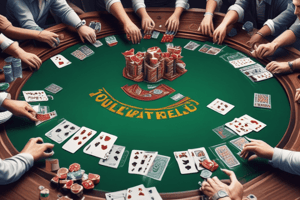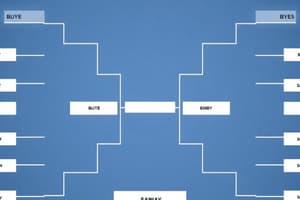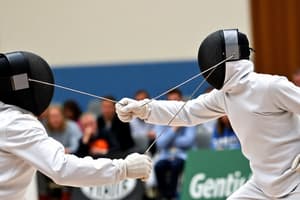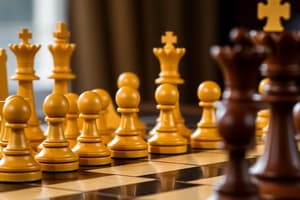Podcast
Questions and Answers
Which of the following nutritional strategies is recommended before a chess tournament?
Which of the following nutritional strategies is recommended before a chess tournament?
- Consuming a large, carbohydrate-heavy meal right before the game.
- Prioritizing high-sugar snacks and drinks for quick energy.
- Eating foods rich in fat and protein, while minimizing sugar and carbohydrates. (correct)
- Skipping meals to avoid feeling sluggish during the game.
What is the suggested duration and type of exercise before an afternoon chess tournament?
What is the suggested duration and type of exercise before an afternoon chess tournament?
- A 45-minute high-intensity interval training session to boost adrenaline.
- No exercise is necessary as physical fitness does not affect chess.
- Intense weightlifting for 1 hour to build physical strength.
- 20-30 minutes of aerobic exercise in the morning. (correct)
Which sleep-related recommendation is suggested for optimal chess performance?
Which sleep-related recommendation is suggested for optimal chess performance?
- Getting less than 6 hours of sleep to maximize alertness.
- Staying up late to practice chess strategies before important games.
- Reducing exposure to blue light from electronics before sleeping. (correct)
- Having a varying sleep schedule each day to maintain cognitive flexibility.
What is the recommended strategy regarding caffeine intake before a chess tournament?
What is the recommended strategy regarding caffeine intake before a chess tournament?
What is the optimal room temperature to enhance chess performance?
What is the optimal room temperature to enhance chess performance?
What is the primary reason for avoiding intense workouts before a game?
What is the primary reason for avoiding intense workouts before a game?
According to the content, why should one refrain from physical activity close to bedtime?
According to the content, why should one refrain from physical activity close to bedtime?
What is the recommended purpose of a cold shower in the morning before a game?
What is the recommended purpose of a cold shower in the morning before a game?
Which of these activities are recommended to do before a game?
Which of these activities are recommended to do before a game?
Why is it suggested to save the bed for sleeping?
Why is it suggested to save the bed for sleeping?
Flashcards
Tournament Nutrition Plan
Tournament Nutrition Plan
A healthy diet plan that emphasizes hydration, lean protein, healthy fats, and minimal sugar intake.
Importance of Sleep
Importance of Sleep
Adequate sleep is essential for peak performance. Aim for 7-9 hours of quality sleep the night before a tournament.
Importance of a Warm-Up
Importance of a Warm-Up
Warm-up exercises prepare your body and mind for the mental and physical demands of a tournament. They help improve coordination and focus.
Time Management in Tournaments
Time Management in Tournaments
Signup and view all the flashcards
Hydration in Tournaments
Hydration in Tournaments
Signup and view all the flashcards
Cold Showers for Sleep
Cold Showers for Sleep
Signup and view all the flashcards
Exercise Before Bed
Exercise Before Bed
Signup and view all the flashcards
Mental Preparation
Mental Preparation
Signup and view all the flashcards
Workout Intensity
Workout Intensity
Signup and view all the flashcards
Breathing Exercises
Breathing Exercises
Signup and view all the flashcards
Study Notes
Boost Tournament Performance
- Before the Game:
- Nutrition: Hydrate by drinking water regularly (aim for 2 liters). Choose foods high in fat and protein, low in sugar and carbohydrates (e.g., avocado, eggs, fish, chicken, nuts). Consider a cup of coffee or tea (or something with less caffeine) if the game is in the afternoon. Avoid heavy meals and high-glucose snacks/drinks. Don't eat late at night (ideally 3 hours before sleep).
- Sleep: Aim for 7-9 hours of sleep. Maintain a regular sleep schedule. A short nap in the afternoon can be helpful.
- Light: Reduce exposure to blue light at night. Use night mode on electronic devices.
- Sound: Play background ambient sound if possible.
- Temperature: Maintain cool temperatures (15-20°C).
- Stress: Avoid stressful activities before the game; save the bed for sleep only. Avoid exercise late at night.
- Cold Shower: Consider taking a cold shower in the morning to activate the body.
- Exercise: 20-30 minutes of aerobic exercise (in the morning if afternoon games). Avoid vigorous workouts to prevent fatigue during the tournament. Gentle exercise, such as walking, is recommended.
During the Game
- Time Management: Get to the tournament early to prepare mentally.
- Hydration & Snacks: Drink water or low-sugar drinks. Include snacks such as dark chocolate (>70%), blueberries, nuts, energy bars, or bananas. Avoid sugary drinks like soda and sweets.
- Concentration: Avoid getting distracted by watching other games. Focus on the present match. Avoid thinking about prizes, tournament situations, or results of other matches.
- Posture: Maintain an upright posture with your spine erect (90-90-90 rule). Take short breaks to stretch. Walking briefly can enhance blood circulation and prevent muscle stiffness.
- Preparation:
- Warm-up: Perform 5 minutes of breathing exercises before the games and visualization.
- Tactical Practice: Solve tactics for 10-15 min before the game.
- Opponent Analysis: Analyze the opponent's style, openings, strengths, and weaknesses using tools (e.g., ChessBase). Review opening variations. Listen to relaxing or motivational music before the match.
- In-Game Strategies: Don't spend too much time on the first few moves. Use time to think about the overall game plan and future moves. If there are many options in a position, avoid making moves until fully confident in a decision. Also, refrain from taking breaks during critical game positions.
Studying That Suits You
Use AI to generate personalized quizzes and flashcards to suit your learning preferences.




